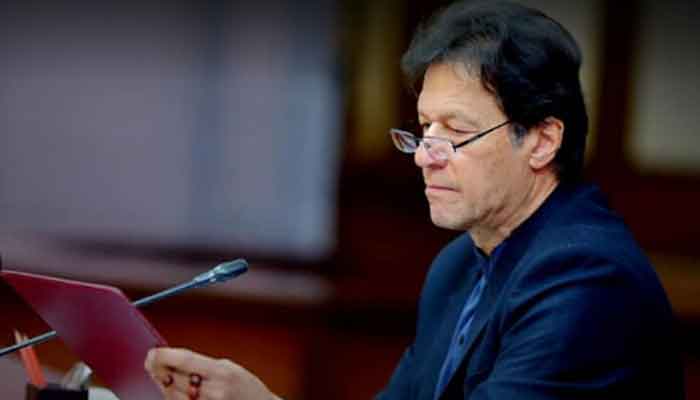Here is all you want to know about PM Imran's 'Ehsaas' program
The preliminary policy statement of the Ehsaas program was tweeted by the Prime Minister Imran Khan on April 8, 2019, which outlined Ehsaas’ 4 pillars and its 115 policy areas
ISLAMABAD: Prime Minister launched “Ehsaas” program, a social protection and poverty alleviation initiative , on March 27.
The preliminary policy statement of the Ehsaas program was tweeted by the Prime Minister on April 8, 2019, which outlined Ehsaas’ 4 pillars and its 115 policy areas.
Ehsaas is an extensive program and it is meant to be implemented through 20 federal ministries/divisions, 6 federal agencies involved in poverty alleviation and social protection, four provincial governments, AJK and GB.
The newly created Division of Poverty Alleviation and Safety Nets is the coordinating agency of the Ehsaas program.
Work has commenced on setting up institutional arrangements—such as oversight committees and working groups—which will be involved in implementing and overseeing Ehsaas.
Meanwhile work on the various schemes which will be launched through Ehsaas has also commenced swiftly. These schemes include: Mazdoor-ka-Ehsaas, Bewaoon-ka-Ehsaas, Yateemo-ka-Ehsaas, Ghareeb Beemar-ka-Ehsaas, Na-tawan-Ka-Ehsaas, Maazoor-ka-Ehsaas, Kissan-ka-Ehsaas, Berozgar-ka-Ehsaas, Beghar-ka-Ehsaas, Ghareeb-buzurgo-ka-Ehsaas, Ghareeb-Talib-e-Ilm-ka-Ehsaas, Khawateen-ka-Ehsaas, and Hakoomat-ko-ghareeb-dost-banane-ke-liye. The first scheme, called “Mazdoor-Ka-Ehsaas”was announced by the Prime Minister on Labor Day, May 1. Under that there are two areas of policy focus.
First, social protection of the informal labor sector; and secondly, welfare of overseas Pakistanis. More than 90% laborers and agriculture workers in Pakistan work in the ‘informal sector’; they are largely unaware of their rights and do not have access to adequate social protection.
There is a desperate need to extend social protection to those working in the informal sector (e.g., agriculture and livestock sector, artisans, construction workers in informal settings, daily wage laborers, domestic workers and rural women workers)and workers in the agriculture sector, especially tenant farmers.
Women often have the weakest employment status amongst the informal economy as their work is seen as an extension of their family responsibilities.
A Labor welfare and social protection expert groups was notified by the Division of Poverty Alleviation and Safety Nets on Thursday, May 2.
On a fast track basis, the labor expert group will make recommendations to extend welfare measures, including minimum wages; occupational health and safety, to workers in the informal economy, including agricultural workers.
It will review the status of legislative development pertaining to welfare measures, identify gaps, and recommended out of box measures for quick implementation.
The group will review institutional arrangements in the post 18th amendment context and make recommendations to address constraints, such as fragmentation of labor social safety nets, corruption and institutional failures which result in exploitation of labor; and enforcement issues with regard to minimum wage, and health and safety regulations The expectation isto have a mechanism of registration for informal workers in place in a years’ time.
Under the Ehsaas framework, the Prime Minister has mandated policy measures for welfare of overseas Pakistani laborers.
It has been decided to increase the role and number of Community Welfare Attaches abroad and to involve well reputed expatriate Pakistanis in that role.
The government has decided to Increase the number of Protector of Emigration Offices.
Prime Minister has given directions to improve quality of pre-departure briefings for migrant workers, and ensure their attendance biometrically so that workers can be made aware about their rights and entitlements (for example insurance), which will ensure that they are not exploited by human resource exporters and employers.
Prime Minister has directed that Protector of Emigration Offices should create one-window for all types of requirements to facilitate migrant workers.
Under the Ehsaas framework, it has also been decided that negotiations will be made with foreign governments to extend the duration of the first contract agreement for workers to a minimum of 3 years because unskilled workers hardly recover their cost of migration before that time.
A policy of subsidy on air tickets for low paid workers abroad, who have not returned home in seven years, has been approved by the Prime Minister under Ehsaas.
Details about this, in terms of how this facility can be accessed, will be shared shortly.
Furthermore, a consolidated labor market information system for overseas employment is being created so that intended migrant workers can be empowered, and are not exploited by middlemen.
Dr. Sania Nishtar, Chair of the Poverty Alleviation Coordination Council says work on implementing the Ehsaas framework is underway at unprecedented speed.
Review institutional arrangements for provision of social protection to workers and their dependents in the post 18th amendment context and make recommendations to address the constraints.
Secretariat of the Group will be in the Poverty Alleviation and Social Safety Division. The group will decide its method of work in its first session and will publish it in the public domain. Drafts prepared by the group would be published on the internet.
The group will submit its recommendations to the Prime Minister within six months. A policy of subsidy on air tickets for low paid workers abroad who have not returned home in last seven years.
-
Security forces gun down 30 terrorists in multiple IBOs in KP: ISPR
-
MQM-P calls for new province in Sindh
-
US report validates Pakistan military edge over India: PM
-
Banned TTP poses serious threat to Pakistan security: UNSC panel
-
CM Afridi clarifies remarks on by-poll after ECP requests army deployment
-
Dubai sees 3.2m Pakistani passengers in 2025 as airport sets new milestone
-
Security forces kill 23 Indian proxy terrorists in KP's Kurram
-
Pakistan to construct island to boost oil exploration: report












